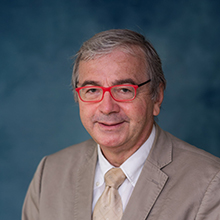What do you teach at Ca’ Foscari? What are your main research interests?
My name is Patrizio Rigobon. I come from Mogliano Veneto, a town in an almost liquid plain, linguistically hybrid, between Venice and Treviso. A border town. I find this situation unbeatable precisely because, as Giuseppe Berto said, "my town is a road". I would also add "two very close international airports and a port". So, it is ideal for escapes, returns, meetings and everything related to travelling and getting to know others. I focus on Catalan literature: a kind of small niche in the mosaic of European languages and literatures. An open culture that has always had relations with Venice.
Tell us about your academic path.
Degree in foreign languages and literature from Ca' Foscari, two years of Political Science in Padua, PhD in Bologna, studies in Barcelona.
What are your professional role models / references?
I don't really think I have any particular role models or references. I have met extraordinary people and small characters. Human reality is also made up of the latter and perhaps from them we learn more about the "actual truth", as Machiavelli would have said, to which I dedicated my first dissertation, trying to draw inspiration from the ethical principles of "extraordinary people". I almost never succeeded.
Have you always known that this was going to be your path?
Well, not from early childhood. But let's say from the age of 14, this passion took shape.
What is the aspect of your research you are most passionate about?
In the case of Catalan language and literature, the lesson from the Catalan people is surprising: they risked succumbing several times throughout history, but they resisted. And in this resistance, language and culture were the key. Understanding the dynamics and the reasons behind these processes is undoubtedly exciting because it combines cultural and political elements.
What does teaching and researching mean to you?
Education is the result of research and should be subordinate to it, guaranteeing its quality and innovation. However, teaching is also a relationship, not just a vehicle for knowledge. In this relationship with our students, which has been partially dissolved during the isolation of the last few months, much of the effectiveness and credibility of teaching is at stake: fairness, dedication and openness should not be mere words, but daily practice.
What has given you the greatest satisfaction in your career?
The very idea of ''researching'' is the greatest satisfaction. And I would add: it must always remain unfulfilled in terms of results so that curiosity is always alive and wonder constantly supports it. This is also why I have chosen to remain a "researcher": I like the word too much and it gives a philosophical and existential flavour to a daily task that never becomes a professional or competitive routine.
The area you have always wanted to be involved in but have not yet had the opportunity to explore?
My curiosity concerns scientific disciplines that I have not attended and which I have not engaged in, but which I appreciate very much. As a literature researcher, saying that I would like to study dendrology may seem like a joke and may not make sense, but it certainly reflects reality. Who knows, maybe in the next life...
What would you say to young people starting their university career?
Open your eyes and ears wide to seize all the opportunities offered by the university and its departments. For the rest, it is better not to give advice, we are all perfectly capable of making mistakes on our own.
Why Ca’ Foscari and Venice?
Because it is a university that is sensitive to innovation, multicultural issues and international relations and is located in a city that defining unique would be an understatement. A small city, all things considered, that has a much greater weight and significance than its demographics would suggest. Ca' Foscari is historically unthinkable without Venice.

